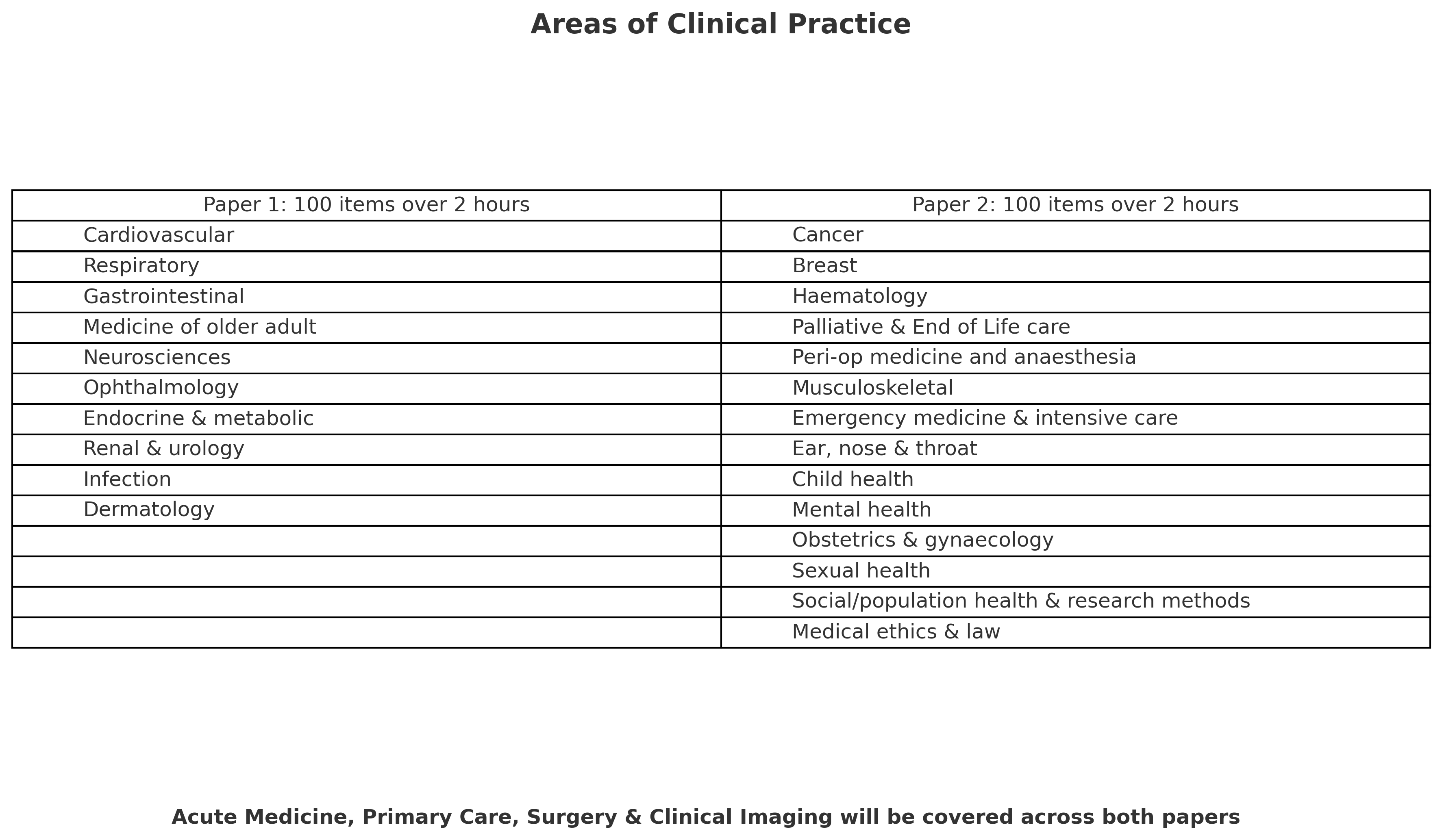Tip 1: Know the exam content
- The Applied Knowledge Test involves Single Best Answer (SBA) questions, all based on the UKMLA Content Map
- The Content Map is based on the GMC's outcomes for graduates
- The Content Map is split into 25 'Areas of Clinical Practice' made up of 311 'Conditions' as well as a range of possible 'Presentations'. Each condition or presentation links to one or more 'Areas of Clinical Practice'
- The Content Map also highlights 13 'Areas of Professional Knowledge' including areas on research, medical ethics and population health
Table illustrating the UKMLA Areas of Clinical Practice
| Area of Clinical Practice | Descriptor |
|---|---|
| Acute and emergency | Includes clinical toxicology and intensive care medicine |
| Cancer | |
| Cardiovascular | Includes cardiac and vascular surgery and rehabilitation |
| Child health | Includes infants, children, young people, and adolescent transition |
| Clinical haematology | |
| Clinical imaging | |
| Dermatology | Includes burns |
| Ear, nose and throat | |
| Endocrine and metabolic | |
| Gastrointestinal including liver | Includes upper and lower GI tract surgery |
| General practice and primary healthcare | Includes rehabilitation |
| Infection | |
| Medicine of older adult | Includes rehabilitation |
| Mental health | |
| Musculoskeletal | Includes rehabilitation, trauma, orthopaedics, and rheumatology |
| Neurosciences | Includes neurosurgery and rehabilitation |
| Obstetrics and gynaecology | |
| Ophthalmology | |
| Palliative and end of life care | Includes pain management |
| Perioperative medicine and anaesthesia | Includes pain management |
| Renal and urology | |
| Respiratory | Includes thoracic surgery and rehabilitation |
| Sexual health | Includes gender medicine |
| Surgery | Includes general, plastic, breast, oral and maxillofacial surgery, and transplantation |
| All areas of clinical practice | Includes medication side-effects |
Tip 2: Know the exam format
- 2 papers of 100 single-best answer questions with 5 possible options in each question
- Each paper is 2 hours long
- It is a computer screen based test and exams either take place in UK medical schools or test centres around the world
- Paper 1 and Paper 2 are split into the following areas of clinical practice, as per the UKMLA AKT Student Handbook

Tip 3: Give yourself plenty of time to revise
- Our analysis suggests more candidates pass the AKT if they have revised for at least 6 months
- This allows enough time to learn and understand the entirety of the UKMLA Content Map
Tip 4: Choose the Right MLA Question Bank
- Regularly testing yourself using a Question Bank is the cornerstone of UKMLA AKT exam preparation
- Revise MLA is the only revision resource dedicated to passing the UKMLA AKT exam
- With over 3000 SBAs, we this provides a strong foundation with which to pass the MLA
- Other question banks may be copies of their original 'finals' or PLAB banks and may not be aligned strategically to the UKMLA Content Map
Tip 5: Practice under exam conditions
- We recommend practising the AKT under exam conditions - in a quiet room with no distractions
- Unfortunately, the Official practice exam for the UKMLA AKT, provided by the AKT Exam Board, is still a PDF / paper mock and so does not fully replicate exam day which is a 'computer-based assessment'
- Fortunately, to complement the official mock exams, Revise MLA has also provided a range of mock papers which replicate the 'on-screen' assessment of the actual exam
